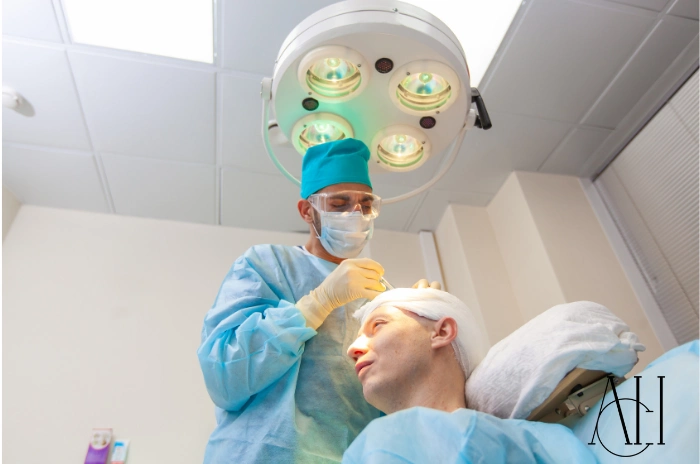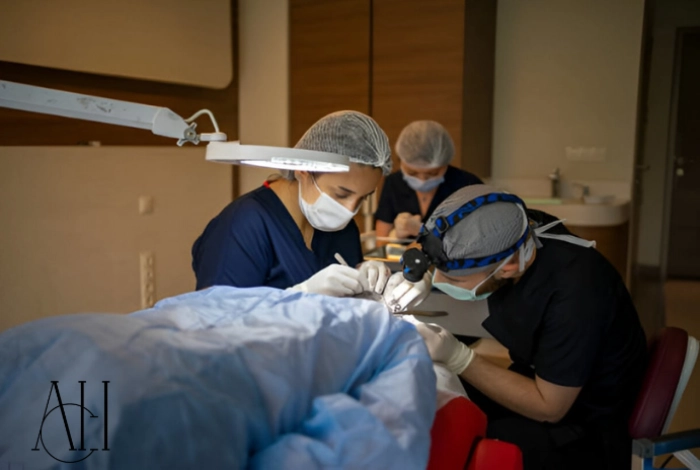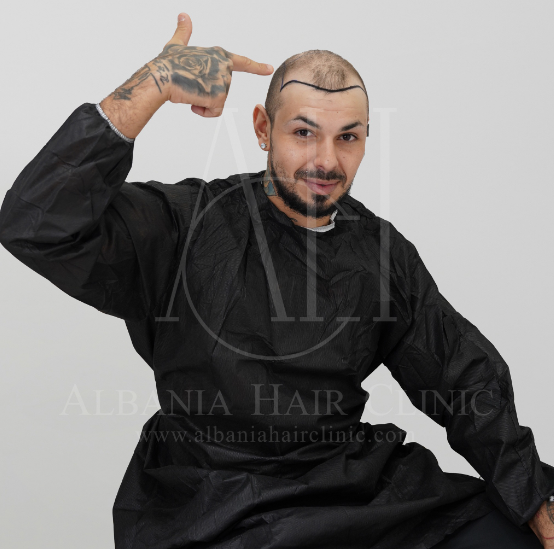A hair transplant is a life-changing procedure that can boost your confidence and improve your appearance. But before the surgery, it is important to prepare well. Good preparation helps you heal faster and get the best results. In this blog, we will explain how to prepare for your hair transplant step by step in simple English. If you take the right steps before your surgery, you will feel more comfortable and confident about your decision.
Table of Contents
ToggleWhy Is Preparing for Hair Transplant Surgery Important?
Better Preparation, Better Results
Getting ready for surgery helps your body and scalp stay healthy before and after the procedure. When you follow pre-surgery instructions, your recovery will be smoother, and the results will be more natural. Preparing early also helps reduce the chances of problems after surgery. It gives both you and your doctor more control over the outcome.
Avoid Risks and Complications
Proper preparation also reduces the risk of infection, bleeding, and poor healing. You give your doctor the best conditions to do their job well when your body is ready. Preparation is not only about your physical health, but also about your mental readiness and comfort.
You Will Have an Informative Consultation with Your Doctor
What to Expect in the Consultation
Before the surgery, you will meet your doctor. They will check your scalp, ask about your health, and explain the process. You can ask questions and talk about your goals. This is the best time to understand the risks, benefits, and expected results of your procedure.
Make a Good Plan Together
Your doctor will make a plan based on your hair loss and donor area. They will also tell you how many grafts you need and what results to expect. Having a clear plan helps avoid surprises and ensures better communication between you and your surgeon.
You Will Come to The Hair Loss Clinic for Your Day Surgery
Same-Day Procedure
Hair transplant surgery is usually done in one day. You will come to the clinic in the morning and go home the same day. There is no need to stay overnight. The staff will make sure you are comfortable and guide you through every step.
Feel Comfortable and Relaxed
Wear loose and comfortable clothes. Bring a snack and water. You can also bring music or something to relax with during the long procedure. Making yourself comfortable can help reduce stress and make the process easier.
PRE-SURGERY INSTRUCTIONS
Listen to Your Doctor
Your doctor will give you specific instructions. Follow them carefully. These include what to eat, what medicines to stop, and how to care for your scalp. Following the advice exactly is key to avoiding problems and ensuring a smooth surgery.
Clean Hair and Scalp
Wash your hair with mild shampoo the night before. Do not use gel, spray, or any hair product on the day of surgery. Keeping your scalp clean helps lower the risk of infection and makes it easier for the doctor to work.
LIFESTYLE CHANGES TO CONSIDER
Eat Healthy
A good diet before surgery helps your body heal faster. Eat fruits, vegetables, and drink plenty of water. Avoid junk food and eat light meals that are easy to digest.
Reduce Stress
Try to stay calm and rest well before your surgery. Stress can affect your body and healing process. Practice breathing exercises, listen to calm music, or take a short walk to relax.
Albania Hair Clinic – Trapianto Capelli in Albania (@albaniahairclinic)’in paylaştığı bir gönderi
What to Do Before a Hair Transplant
Get Your Medications Ready
Talk to your doctor about which medicines to stop. Have your pain relief or antibiotics ready if prescribed. Keep them in a place where you can easily find them after the surgery.
Prepare for Aftercare
Have clean pillows, a neck pillow, and the right shampoo at home for after the surgery. Plan for someone to help you if needed. This will make recovery more comfortable and prevent strain.
Important Considerations in the Days Leading Up to Surgery
Up to a Month Before the Procedure
Start avoiding smoking and alcohol at least one month before surgery. This helps your blood flow and healing. Healthy habits make your body stronger and ready for surgery.
10 Days Before
Stop taking blood-thinning medications like aspirin or ibuprofen. Avoid vitamins and supplements unless your doctor says it is okay. Also avoid herbal teas and products that can cause bleeding.
Preparing for the Day of Surgery
The Night Before
Get a good night’s sleep. Do not eat or drink after midnight if your doctor advises. Lay out your clothes and items you need for the day to avoid stress in the morning.
On the Day
Eat a light breakfast if allowed. Do not wear tight clothes. Remove any jewelry or makeup before arriving. Bring your ID and any forms or documents the clinic has asked for.
Golden Rules for Recovery After Hair Transplant
Follow Post-Surgery Instructions
Your doctor will give you care instructions. Follow them for the best recovery. These will include when to wash your hair, what to avoid, and how to take your medicines.
Keep the Area Clean and Dry
Do not touch, scratch, or wash the scalp too soon. Wait until your doctor says it is okay. Use a clean pillowcase and avoid any activities that may cause sweating.
Recovery Process From A Hair Transplant
First Few Days
You may have some swelling, redness, and slight discomfort. Use your medicine as directed. Sleep with your head elevated. Keep in touch with your clinic if you have questions.
After One Week
Scabs will begin to fall off. Hair shedding may start. This is normal and part of the healing process. Do not panic—the real hair growth will begin after this phase.
Before the Surgical Day
Get Everything Ready
Prepare your clothes, food, and recovery area. Make sure you have time to rest after the procedure. Charge your phone and keep important items within reach.
Avoid Caffeine
Do not drink coffee or energy drinks. They can raise your blood pressure and affect healing. Drink water or herbal tea instead.

Anesthesia
Local Anesthesia
Most hair transplants use local anesthesia. You will be awake but feel no pain in your scalp. The area will be numb, so you will feel pressure but not discomfort.
Stay Calm and Still
The doctor may give a light sedative to help you relax. The area will be numb during the procedure. You can talk to the staff if you feel any discomfort.
Donor Excision
Taking Hair from the Donor Area
Hair is taken from the back or sides of your head where hair is thick. The doctor uses a small tool to remove follicles carefully. This is done gently to avoid damage.
No Harm to Nearby Hair
Only selected hairs are removed, so it doesn’t affect how your donor area looks much. You can cover this area easily with your natural hair.
Graft Preparation
Cleaning and Sorting Grafts
The hair follicles are cleaned and sorted. Each graft may have 1 to 4 hairs. They are kept in a special solution until they are placed. The goal is to keep them healthy and alive.
Ready for Implanting
Proper care in this step helps grafts survive and grow well. Skilled technicians handle this part of the process with precision.
Recipient Sites and Graft Placement
Making Tiny Openings
The doctor makes small holes in the balding area. This is where the grafts will go. These sites are carefully planned to match the natural direction of your hair.
Careful Placement
Each graft is placed carefully at the right angle and direction to look natural. This takes time and focus to ensure good results.
How Many Hair Grafts Do I Need?
Depends on Your Hair Loss
The number of grafts needed depends on how much hair you have lost and your goals. Some people need 1000, others may need 3000 or more. Your doctor will assess your scalp to decide.
Your Doctor Will Decide
During your consultation, your doctor will give you a number based on your scalp condition. They will also consider the thickness of your hair and your age.
Things To Avoid Before Your Procedure
Don’t Cut Your Hair Too Short
Keep your hair long enough so the doctor can see the natural pattern. Do not shave your head before surgery unless told. Your doctor may need the hair to help plan the design.
Stay Away from Hair Products
No gel, wax, or spray on the day of surgery. These can affect the scalp and make the surgery harder. Clean hair makes the process easier and safer.
Do Not Take Blood-Thinning Medicines
These Increase Bleeding
Medicines like aspirin, ibuprofen, and some supplements can increase bleeding. Stop them at least 7–10 days before. Always read medicine labels or ask your doctor.
Ask Your Doctor
Always check with your doctor before stopping any medicine. They may give you safer alternatives if needed.

Stay Away From Alcoholic Beverages, Tobacco, And Caffeinated Beverages
They Affect Healing
Alcohol and tobacco reduce blood flow and healing. Caffeine can raise your heart rate and increase bleeding risk. These substances should be avoided for better results.
Stop Early
Stop using them at least 3–5 days before surgery, or earlier if advised. This small change can make a big difference in healing.
Avoid Exercising
Rest Your Body
Exercise can increase blood pressure and cause sweating, which may harm the healing scalp. Your body needs rest to recover well from surgery.
Avoid Until Cleared
Stop heavy exercise at least 3 days before and wait until your doctor says it’s safe to start again. Light walking is usually okay, but ask first.
How To Prepare 10 Days Before Your Hair Transplant
Plan and Rest
Take time off work and avoid stress. Prepare your home and schedule. Give yourself enough time to relax and heal properly.
Final Check With Your Clinic
Confirm your appointment, ask any last questions, and review instructions. Being fully informed helps you feel more confident.
Types of Anesthesia
Local vs. Sedation
Most surgeries use local anesthesia. In some cases, light sedation is also given to help you stay calm. You can talk to your doctor about which one is best.
Safe and Common
These methods are safe and used worldwide. You can return home the same day without much trouble.
Helpful Tips For The Day Of Your Treatment
Bring a Friend
You may feel tired after surgery. Bring someone to drive you home or help you after the procedure. Having support makes the day easier.
Be on Time
Arrive early and relax. Give yourself time to check in and settle. Do not rush, as staying calm is very helpful.
The Right Position For Sleeping After A Hair Transplant Procedure
Sleep with Head Raised
Use 2 pillows or a neck pillow to keep your head up. This reduces swelling. It also helps keep pressure off the new grafts.
Avoid Rubbing the Grafts
Do not sleep on your side or stomach. Sleep on your back to protect the grafts. Sleeping right helps avoid damage.
Washing Your Hair After Your Hair Transplant
Wait for Doctor’s Instructions
You can usually wash your hair gently after 2–3 days. Use special shampoo provided by your clinic. Do not rush this step.
Be Gentle
Do not scrub or rub. Pour water slowly over your scalp and dry gently. Avoid strong water pressure.
On The Day Of The Hair Transplant Procedure
Stay Calm
The staff will explain everything. Ask questions if you are unsure. They will guide you step by step.
Relax and Trust the Process
The procedure may take several hours, so bring music or a book to stay relaxed. Trust your doctor and enjoy the journey to new hair.
Frequently Asked Questions
What should I avoid before a hair transplant?
Avoid alcohol, tobacco, caffeine, and blood-thinning medicines at least 7–10 days before your surgery. These can affect your healing and increase risks during the procedure.
Can I eat before my hair transplant surgery?
Yes, you can usually eat a light breakfast unless your doctor tells you not to. Avoid heavy meals and drink water to stay hydrated.
How should I wash my hair before the procedure?
Wash your hair with a mild shampoo the night before surgery. Do not use any gel, spray, or hair products on the day of your procedure.
Do I need to shave my head before a hair transplant?
No, do not shave your head unless your doctor tells you to. Keeping some hair helps the doctor design a natural-looking result.
What should I bring on the day of my surgery?
Wear loose, comfortable clothes, and bring a snack, water, and maybe headphones or a book to help pass the time during the procedure.




